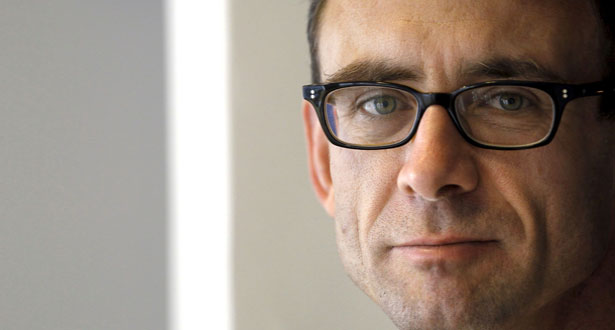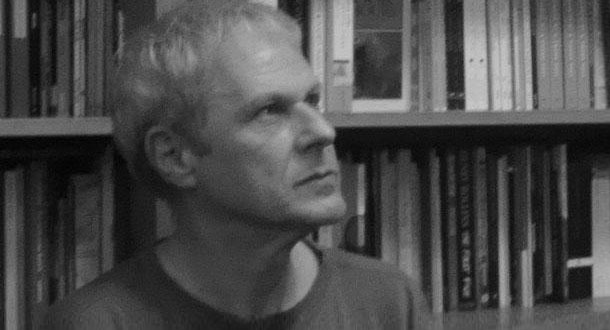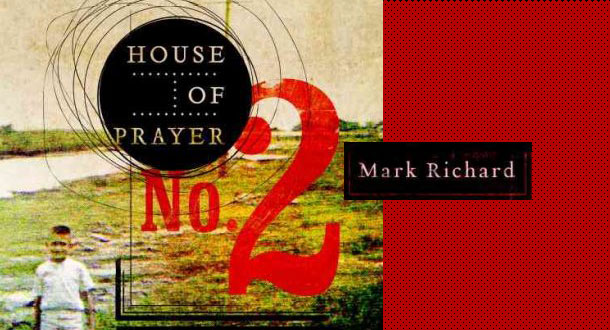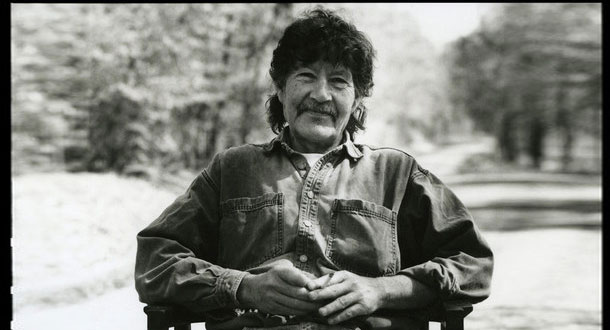Author photo via
Jeremy Robert Johnson is the author of the critically-acclaimed cult novel Skullcrack City and the collection Entropy in Bloom. His fiction has been praised by the Washington Post and authors such as David Wong and Jack Ketchum. Recently he was kind enough to answer some questions about his latest novella, In the River.
I thought Cameron Pierce was the only Oregon writer allowed to write about fishing. Yet, you just released In the River. Explain yourself.
We got a special permit since Cameron published the book. He helped me sneak by those regulations like a baby kokanee in the belly of a rainbow trout. (But honestly, the overall book is about fishing in the same way Ketchum’s Off Season is about cooking.)
Amazon decided to classify In the River under the category “Sports Books” which makes me think they didn’t have “Heartbreaking and Surreal Explorations of Loss and Grief” as a category. Close enough, though.
How long did it take you to write this? Theoretically, I suppose its short length would allow someone to read the novella in one sitting, but speaking from personal experience, it took me nearly a week to reach the end. This story is emotionally draining for the reader, so I wonder how it affected your state during the writing process?
Writing In the River took frustratingly long—around a year for just 22,000 words—for a few reasons.
First, in trying to go for a kind of timeless, parable-like feeling I had to develop a syntax which was entirely different than my natural voice. So not being able to use contemporary idioms, or having many opportunities for dialogue, or being able to swear or crack jokes…all of that made it very painstaking and arduous.
Next, because I am ridiculous, I wanted to base the story in this kind of dreamy, magical jungle environment, but also root the setting in the real world. Which means that any person who wanted to could look at the contextual clues and tie the story to an actual year, real South American geography, rivers, tribes, flora/fauna, mythology, fishing techniques, etc. I felt like that veracity, though obscured, would give the story extra authority.
Finally, it was challenging to come to the page for this thing, which was weird. I’ve never been more passionate about wanting—needing—to tell a story, but there were some scenes that gutted me as I wrote them, and I knew they would. (As an aside, I used to scoff at how dramatic Stephen King was when he talked about writing Gage’s exhumation scene in Pet Sematary, but back then I didn’t have a son. Now…I get it.) So, in deciding to try to come to terms with and examine/interrogate my own worst fears as a father, and deal with some close familial losses, and in wanting to be as emotionally earnest or sentimental as that might require, I created a really difficult work environment: staring long and hard at the one thing I’d prefer to not think about, bumming myself way-the-fuck out while trying to craft a story in a hyper-specific mode. And then I’d go pick up my son from Kindergarten. Little dude got some long hugs during that process.
In the River came as a sort of surprise, given there had been zero promotion before its release. One day we lived in a world without a kickass new novella by Jeremy Robert Johnson, then suddenly, without warning, the world became a slightly better place. Any particular reasoning behind this strategy?
I could pretend it was a strategy, but honestly I was just super fucking tired of marketing. I feel like that stuff is the worst of the mental pollution created by the writing business. It’s a necessary evil, but after spending a year in berserker mode behind Skullcrack City, and knowing I’d be going to the mattresses for Entropy in Bloom, I told Cam, “We’re just going to release this thing. No advance buzz, cover reveals, vaguebooking, blurbs, ARC’s, reviews…nothing. Just the writing, and we’ll present it in a simple, austere way. And we’ll let the book survive based solely on its virtues.”
The other thing is, how do you “market” In the River? With Skullcrack City it was easy for me to say, “This thing is crazy, and I hope you enjoy it.” I could imagine someone getting some escapist kicks from that book. But In the River’s content is really challenging and painful, and the story was so close to my heart and took so much out of me it would have felt strange to come up with, like, taglines and the kind of pulpy marketing pitches I normally work up for my books. Picture that 70’s trailer voice saying, “Discover the terrible hunger and mind-bending horror waiting for you…IN THE RIVER!” Wouldn’t work.
Also, it felt great to separate art from commerce and say, “I made something really personal and I think it’s my best work and I hope you have an intense experience if you check it out.” And leave it at that.
When In the River dropped back in August, you donated the first month's royalties to Portland Homeless Family Solutions. What does this particular foundation mean to you, and how much did the novella end up raising?
My friend J. David Osborne once told me, “People only have so many fucks to give” and I think that’s very true, so at some point I decided I would do my best to actively give a fuck about two things: mental illness advocacy and child welfare. In the past I’d worked with groups like NAMI and PROTECT, which are both awesome, but this time I wanted to find a way to give aid related to those issues in tandem. So, since PHFS works to address both homelessness—which is often intimately tied to mental health—and the safety of children placed at risk by that issue, they seemed like a great fit. Plus, an ER nurse told me PHFS is one of the places her hospital refers folks to, so they were somewhat vetted for me.
I think PHFS offers an important service to our community. They do the nightly shelter thing, keeping people dry and warm and fed, but they also do a lot of great work in helping families experiencing a hardship get back on their feet so they really have a shot at exiting the cycle of homelessness and oppressive poverty. And while they’re doing that work they create a safe, consistent environment where kids don’t have to feel so scared. That’s easy to get behind.
In the River sold almost 300 copies that first month. Readers got behind the book and Powell’s ordered a big batch, and we were very pleasantly surprised. My royalties came in right before the holidays and I rounded ‘em up a pinch and was able to donate $600, which made me really happy. Being able to build something like that with readers, and turn this very painful art into something tangible that helped Portland families through hard times—it was awesome.
I've noticed on social media sometimes you'll barricade yourself in a motel room and commit to extensive writing sprints. I was hoping you could shed some more light on these trips. What first inspired them? How long do you typically hole up? Is it always the same motel? Any weird encounters with the staff?
Carlton Mellick III was the first guy to tell me about binge-writing weekends. Eraserhead Press and a batch of other small publishers were in the midst of unveiling the whole Bizarro thing and they wanted a novella from me for the first Bizarro Starter Kit, to launch at the 2006 World Horror Convention. So I agreed and had a very tight and sudden deadline so we could make it to press and have inventory in time for the con, and Carl told me I could write it the next weekend if I drank a disgusting amount of caffeine and didn’t sleep. I was wary, but we ended up betting each other $100 that would default to the other guy if you failed to finish, and I bought a couple pizzas and a ton of Red Bull and locked myself in my office for a weekend and came out with Extinction Journals. At one point on day three I actually passed out and then woke up when my head smacked the keyboard (which goes a long way toward explaining that structurally questionable third act).
 I don’t do the “stay awake the whole time” thing anymore because I feel you eventually hit diminishing returns with the sleep dep. But these writing lockdowns are a great way to enter a fugue state and stay productive and when you hit those creative alpha-waves there are no distractions to pull you away from the tone and intent. You can go into that mode for half a day, forgetting to eat, listening to the same album on loop. It’s a good way to let a chunk of the book pour out of you, especially if you have the end of the project as a session goal. Plus, Ballard and Ishiguro both used that method, and I think Clevenger used to do hotel lockdowns to finish novels, so there’s a solid precedent.
I don’t do the “stay awake the whole time” thing anymore because I feel you eventually hit diminishing returns with the sleep dep. But these writing lockdowns are a great way to enter a fugue state and stay productive and when you hit those creative alpha-waves there are no distractions to pull you away from the tone and intent. You can go into that mode for half a day, forgetting to eat, listening to the same album on loop. It’s a good way to let a chunk of the book pour out of you, especially if you have the end of the project as a session goal. Plus, Ballard and Ishiguro both used that method, and I think Clevenger used to do hotel lockdowns to finish novels, so there’s a solid precedent.
I can do these things for two days now, anywhere there’s a mini-fridge and a desk and no WiFi. And it’s nice to have a shower, since that’s where my muse hides and gives me answers to problems. Typically the staff never see me after check-in because I buy groceries, set up my desk, and then disappear into the work. But if I am going to pop up for continental breakfast I prefer to stay at hotels where they have those little waffle makers with the golden batter. Those things are fucking awesome.
Entropy in Bloom might be one of the finest horror collections I've ever read. The clear standout, I think, is the novella at the end: "The Sleep of Judges." I had never wondered what The 'Burbs would have been like if David Cronenberg had directed it, but after reading your novella, I suddenly held a very clear picture. This was original to the collection, right? I think I read somewhere that a real-life house burglary inspired its initial idea?
Thanks—“The Sleep of Judges” is brand new and exclusive to Entropy in Bloom, and The ‘Burbs and Straw Dogs and my perpetual sense of existential dread were probably the three biggest influences on that story! Originally Night Shade Books was cool with EIB being a “Best of” retrospective collecting the most popular stories from Angel Dust Apocalypse and We Live Inside You, with the hope that there would be this untapped audience in the mainstream horror and literary markets that would discover my work. But I was a little skeptical of that idea—even the stuff selected for EIB is pretty insane by conventional standards, and the prior two collections had already sold over 14,000 copies so I was worried we might have reached market saturation for my particular type of weird, genre-jumping shenanigans. I really wanted a solid reason for old school readers to pick up EIB and have a great time with it, so I asked my editor if I could write a new novella—loosely tied into the Skullcrack City universe—to anchor the book, and he said of course, and between that and Evenson’s amazing intro and the Author’s Notes the book ended up being about 30% brand new.
And yeah, there’s a ton of “The Sleep of Judges” that was heavily influenced by my family’s house being burglarized about two years ago. I was attending the Bizarrocon Awards Banquet when my wife made the discovery and called me, and I bolted home to deal with the cops and get the house secured. The aftermath of that experience, and its effect on my wife and son, and all these strange details surrounding the event and weird occurrences afterwards coalesced into a deep, unsettling paranoia, and “Judges” was my best attempt to exorcise those feelings.
What are you working on now? Are you allowed to discuss the next project readers might see from you?
Well, there’s some crazy news related to the forthcoming film adaptation of “The Sleep of Judges” but I can’t give the official “in development” scoop until three different entities finish shuffling legal docs. I know the director met with the producers when they were in town for the Golden Globes, and they are very excited about the director’s vision for the project. He says, “They’re going to let us make the kind of horror film we’d want to watch.” This is a guy whose films I love, working with a production company behind some of my favorite films of the last five years, and now one of the best showrunners in the business is on board as Creative Producer, so I’ve got my fingers crossed tight that we make it to that fabled greenlight.
Also, I’m closing in on the end of my next novel, but I’m contractually prohibited from saying much more about it at this point. I can confirm—after the more restrained, literary horror of “The Sleep of Judges” and In the River—that this is a return to the manic humor and conspiracy and body-horror that I had so much fun working with in Skullcrack City. It’s this officially insane attempt to merge mid-career Linklater with early Cronenberg with The Lord of the Flies with The Outsiders with jacked-up 4X4 trucks with bio-tech with…I mean, you get the idea: it’s another chaotic, heartfelt attempt to entertain and connect with other weird humans. I hope people will dig it.

About the author
Max Booth III is the CEO of Ghoulish Books, the host of the GHOULISH and Dog Ears podcasts, the co-founder of the Ghoulish Book Festival, and the author of several spooky books, including Abnormal Statistics, Maggots Screaming!, Touch the Night, and others. He wrote both the novella and film versions of We Need to Do Something, which was released by IFC Midnight in 2021 and can currently be streamed on Hulu. He was raised in Northwest Indiana and now lives in San Antonio.

.jpg)




